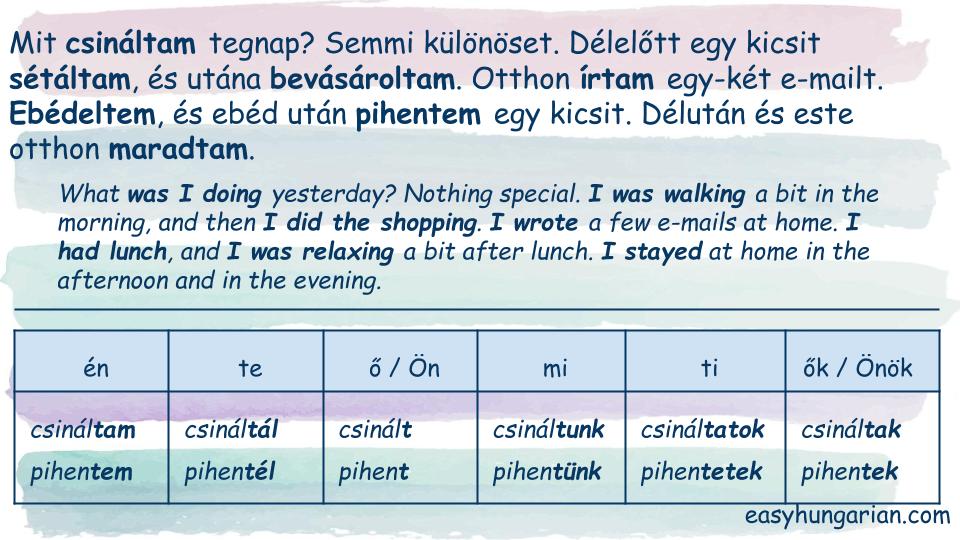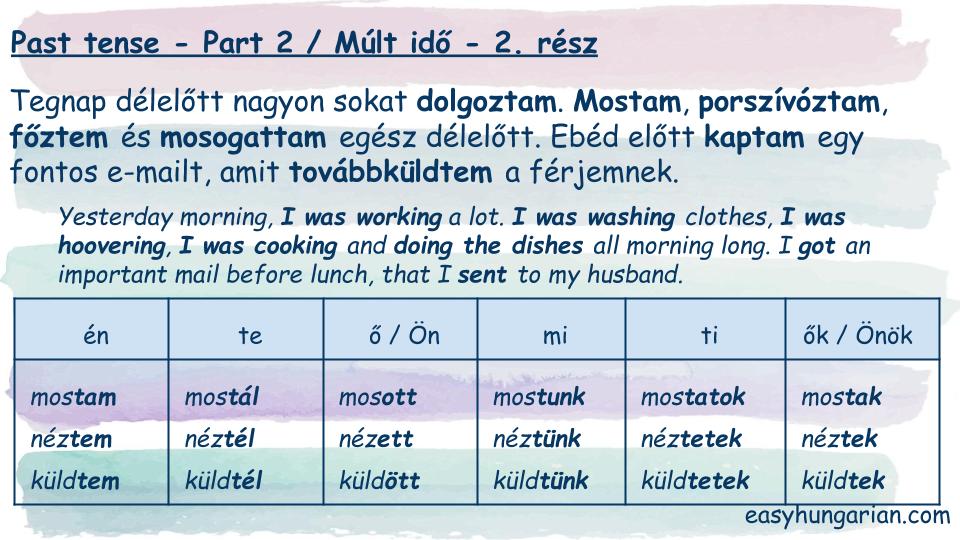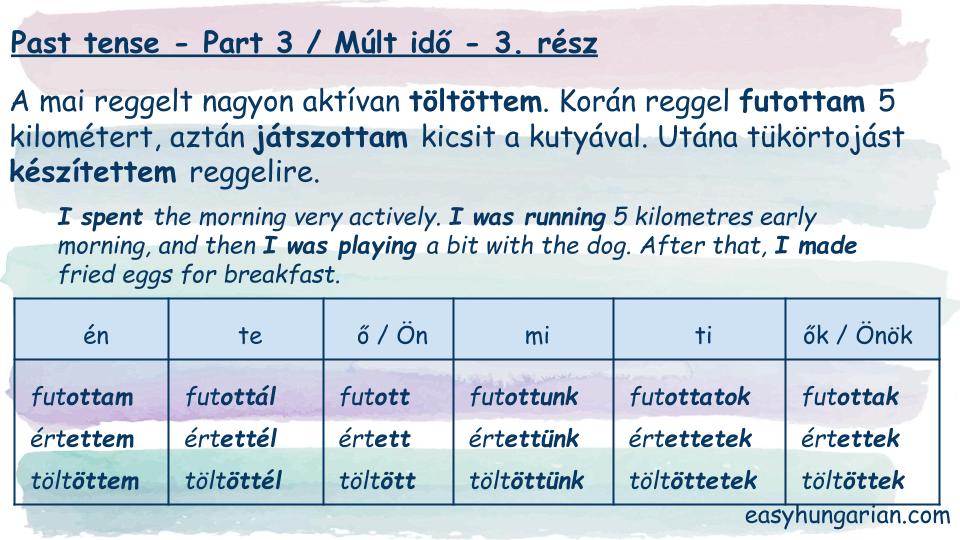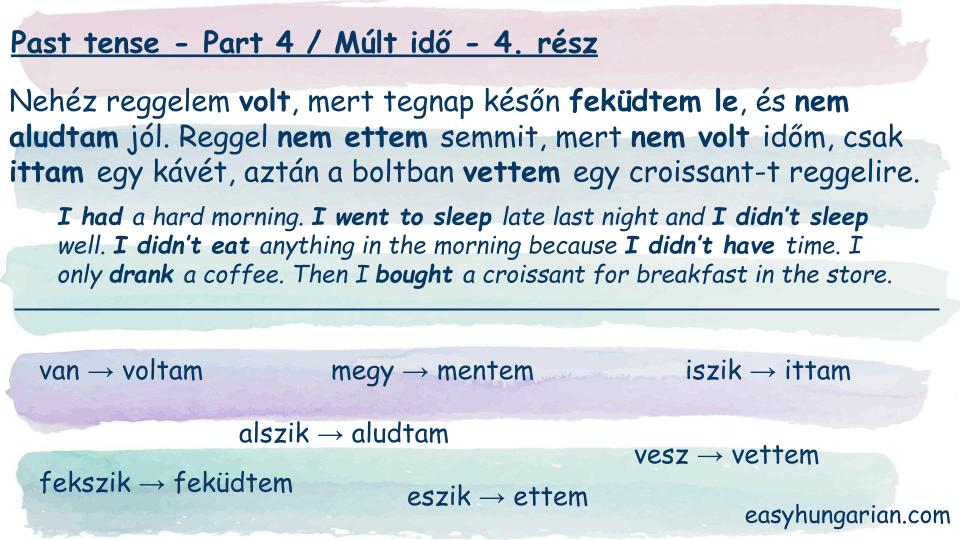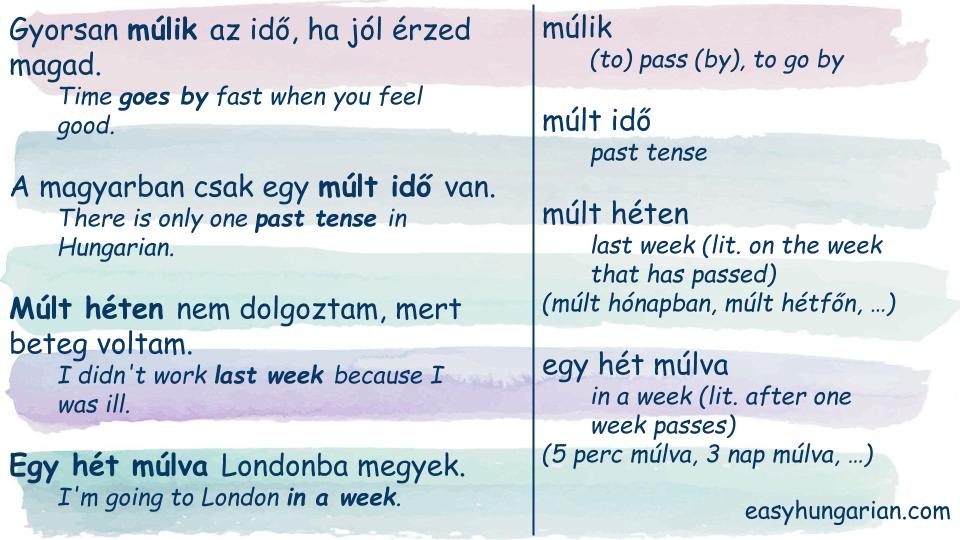Múlt idő - tanulókártyák / Past tense - learning cards
Hungarian verbs can be divided into 4 groups regarding their past tense forms.
Those verbs go to the 1st group that have a ‘-t’ in the past in every grammatical person. E.g. ‘Ma reggel korán keltem.’ (I got up early this morning.) ‘Kinek írtál tegnap?’ (Who did you write to yesterday?). Verbs that belong here: tanul, sétál, beszél, csinál, vásárol, marad, kér, etc.
Verbs in the 2nd group behave almost the same way as verbs in the first one. The endings are the same, only the third person endings (ő) are different in the indefinite conjugation where it is not a ‘-t’ but ‘-ott, -ett, -ött’. Verbs that end in ‘-s, -sz, -z’ always belong to this group. Other verbs here are szeret, fizet, beszélget, tud, ad, hív, etc.
Tegnap gulyást főztem.
I was cooking goulash yesterday.
Péter tegnap gulyást főzött.
Peter was cooking goulash yesterday.
Verbs in group 3 never get an only ‘-t’ in the past but there is an extra syllable with ‘-tt’ in every grammatical person. E.g. ‘Tegnap sokat segítettem a kollégámnak.’ (I helped my colleague a lot yesterday.) ‘Mit sütöttél tegnap?’ (What did you bake yesterday?). Verbs that end in ‘-ít’ belong to this group, e.g. segít, fordít, készít, takarít, etc. Some of the verbs that end in ‘-t’ or a double consonant are also in this group. E.g. fut, süt, nyit, ért, játszik, hall, etc.
In group 4, there are the irregular verbs. These are the following: van, jön, megy, alszik, fekszik, eszik, iszik, tesz, vesz, hisz, visz. Here are a few example sentences to show some forms.
Tegnap nem mentem dolgozni, mert beteg voltam.
I didn’t go to work yesterday because I was sick.
Jól aludtál?
Did you sleep well?
Reggel nem ettem semmit, csak egy kávét ittam.
I didn’t eat anything in the morning, I just drank a coffee.
Anna nem evett semmit.
Anna didn’t eat anything.
Those verbs go to the 1st group that have a ‘-t’ in the past in every grammatical person. E.g. ‘Ma reggel korán keltem.’ (I got up early this morning.) ‘Kinek írtál tegnap?’ (Who did you write to yesterday?). Verbs that belong here: tanul, sétál, beszél, csinál, vásárol, marad, kér, etc.
Verbs in the 2nd group behave almost the same way as verbs in the first one. The endings are the same, only the third person endings (ő) are different in the indefinite conjugation where it is not a ‘-t’ but ‘-ott, -ett, -ött’. Verbs that end in ‘-s, -sz, -z’ always belong to this group. Other verbs here are szeret, fizet, beszélget, tud, ad, hív, etc.
Tegnap gulyást főztem.
I was cooking goulash yesterday.
Péter tegnap gulyást főzött.
Peter was cooking goulash yesterday.
Verbs in group 3 never get an only ‘-t’ in the past but there is an extra syllable with ‘-tt’ in every grammatical person. E.g. ‘Tegnap sokat segítettem a kollégámnak.’ (I helped my colleague a lot yesterday.) ‘Mit sütöttél tegnap?’ (What did you bake yesterday?). Verbs that end in ‘-ít’ belong to this group, e.g. segít, fordít, készít, takarít, etc. Some of the verbs that end in ‘-t’ or a double consonant are also in this group. E.g. fut, süt, nyit, ért, játszik, hall, etc.
In group 4, there are the irregular verbs. These are the following: van, jön, megy, alszik, fekszik, eszik, iszik, tesz, vesz, hisz, visz. Here are a few example sentences to show some forms.
Tegnap nem mentem dolgozni, mert beteg voltam.
I didn’t go to work yesterday because I was sick.
Jól aludtál?
Did you sleep well?
Reggel nem ettem semmit, csak egy kávét ittam.
I didn’t eat anything in the morning, I just drank a coffee.
Anna nem evett semmit.
Anna didn’t eat anything.
